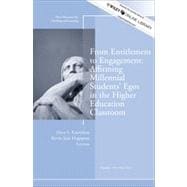This volume addresses theories and practices surrounding the entitled, self-absorbed students called Millennials. Stereotypical Millennials are often addicted to gadgets, demand service more than education, and hold narrow perspectives about themselves and those around them; when seen through this lens, Millennial students can understandably frustrate the most dedicated of professors.
The contributors show how new and better educational outcomes can emerge if professors reconsider Millennials. First and foremost, many of these students simply don’t fit their stereotype. Beyond that, the authors urge faculty to question commonly held assumptions, showing them how to reevaluate their pedagogical practices, relationships with students, and the norms of college classrooms. Contributors focus on practical means to achieve new and more evocative outcomes by treating Millennial students as serious collaborators in the learning process, thereby helping those students to more closely identify with their own education. The assignments that professors give, the treatment of topics that they broach, and the digital tools that they ask students to employ can shift students’ concerns away from a narrow focus on impersonal, technical mastery of content and toward seeing themselves as Millennial thinkers who fuse their lives with their learning.
This is the 135th volume of this Jossey-Bass higher education series. New Directions for Teaching and Learning offers a comprehensive range of ideas and techniques for improving college teaching based on the experience of seasoned instructors and the latest findings of educational and psychological researchers.








